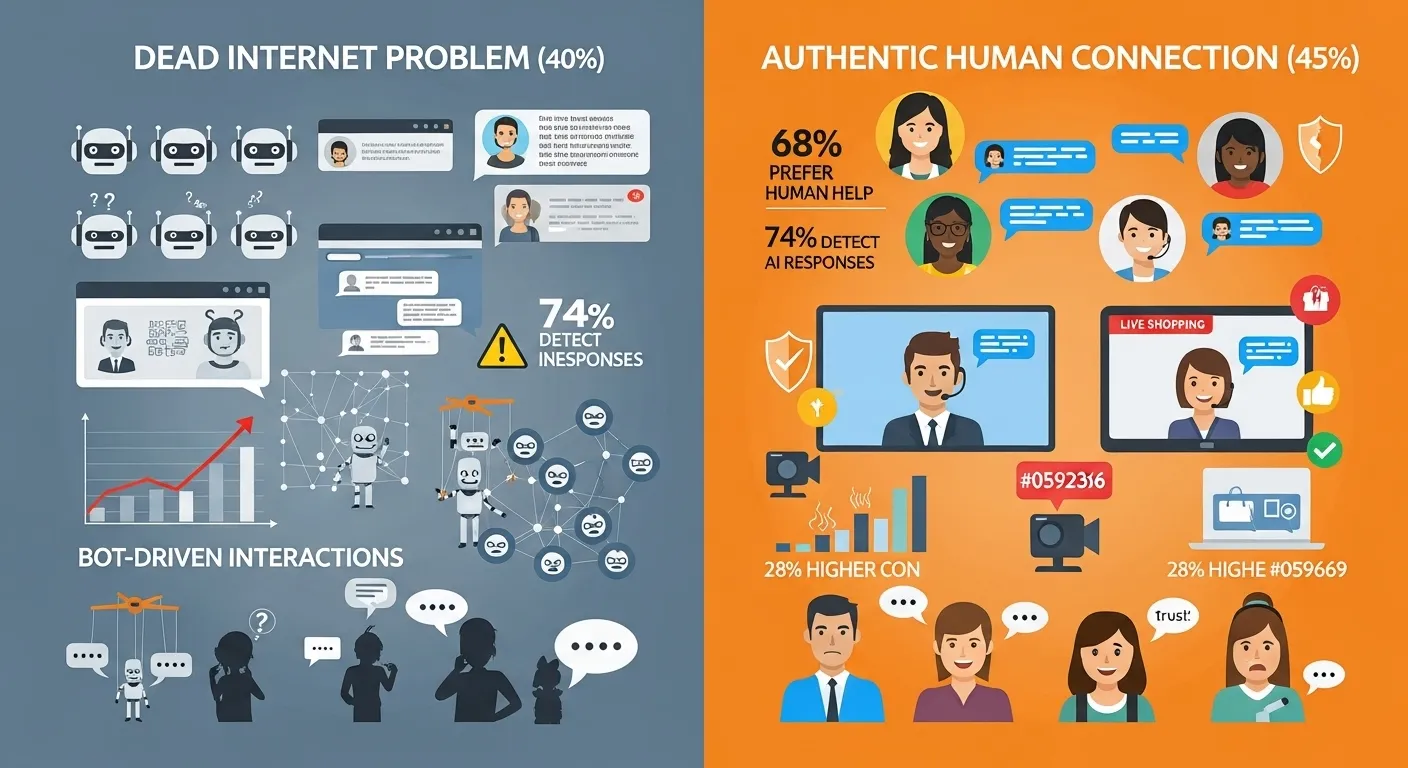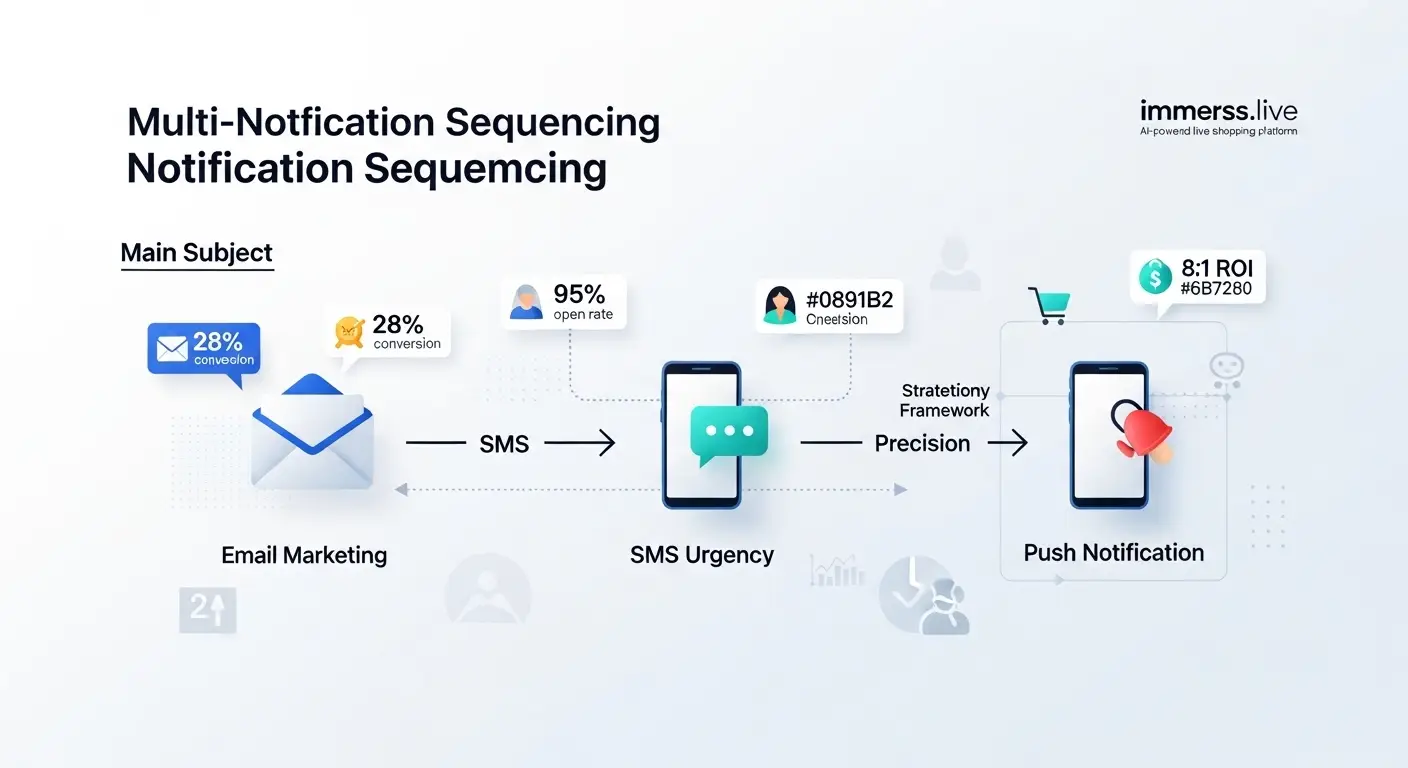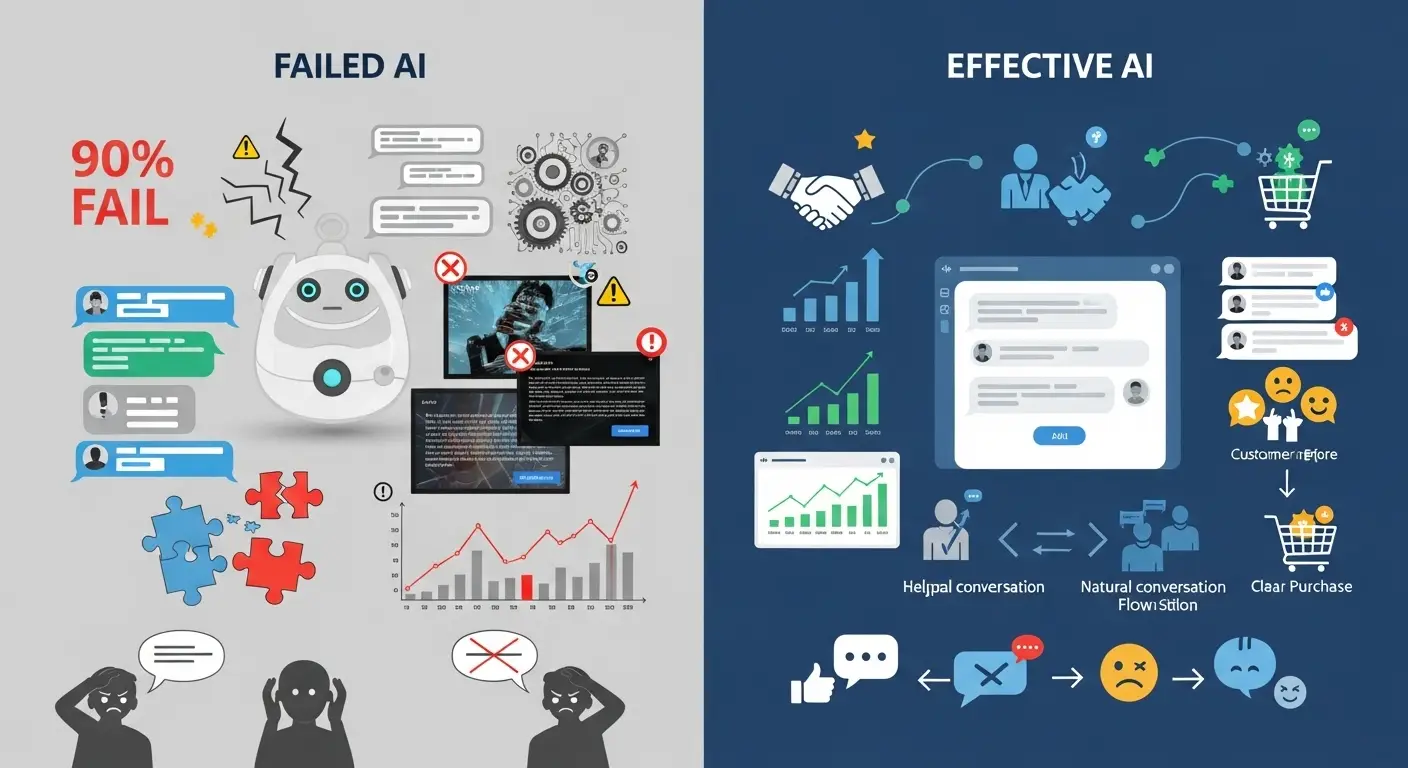The Dead Internet Crisis: Why Authenticity Matters More Than Ever
What happens when consumers can no longer tell if they’re talking to a human or a bot? A recent discussion on r/Entrepreneur revealed a growing frustration that’s quietly reshaping how people interact online: “I feel most answers are just bots at this point.” The poster, seeking genuine human conversation, captured a sentiment that’s becoming increasingly common across digital platforms.
This phenomenon, known as the “dead internet theory,” suggests that much of online content is now generated by bots and AI systems rather than real humans. While the theory’s extreme claims may be debatable, the underlying concern about authenticity strikes at the heart of a critical challenge facing ecommerce businesses today: building genuine trust with customers in an increasingly artificial digital landscape.
For online retailers, this authenticity crisis presents both a significant challenge and a tremendous opportunity. Understanding how consumer skepticism about AI-generated content affects purchasing decisions could be the difference between thriving and struggling in tomorrow’s ecommerce environment.
The Authenticity Gap in Digital Commerce
Consumer behavior research reveals a stark disconnect between how businesses deploy AI and what customers actually want. While companies rush to automate customer interactions through chatbots and AI-generated content, surveys consistently show that 68% of consumers prefer human assistance for complex purchasing decisions, and 74% can identify AI-generated responses with concerning accuracy.
The Reddit user’s frustration reflects a broader consumer sentiment: people are becoming increasingly sophisticated at detecting artificial interactions, and they’re growing tired of them. This detection isn’t just about obvious bot responses—customers can sense the difference between genuine engagement and scripted interactions, even when the AI is technically proficient.
The Trust Erosion Problem
When customers suspect they’re interacting with bots, several predictable behaviors emerge that directly impact ecommerce performance:
Purchase Hesitation: Customers pause longer before making buying decisions when they’re unsure about the authenticity of the information they’re receiving. This hesitation translates to higher cart abandonment rates and longer consideration periods.
Increased Skepticism: Once customers identify one AI interaction as unsatisfactory, they become more suspicious of all digital touchpoints, requiring additional validation before trusting product information or recommendations.
Seeking Alternative Validation: Customers increasingly turn to third-party sources—reviews, social media, or external research—when they don’t trust the primary source of information, lengthening the sales cycle and reducing conversion efficiency.
Brand Perception Impact: Businesses perceived as overly reliant on artificial interactions struggle with brand warmth and trustworthiness metrics, affecting long-term customer loyalty and advocacy.
The Human Connection Premium
Contrary to technology industry assumptions, the push toward AI automation in customer interactions has created what researchers call a “human connection premium”—situations where demonstrating authentic human involvement significantly increases customer value perception and conversion likelihood.
Studies from customer experience laboratories show that when customers know they’re interacting with real humans, several measurable improvements occur:
- 28% higher conversion rates on complex product selections
- 43% improvement in customer satisfaction scores for support interactions
- 35% increase in average order values when personal recommendations are involved
- 67% higher likelihood of repeat purchases following human-assisted shopping experiences
These metrics suggest that authenticity isn’t just a philosophical preference—it’s a competitive advantage with measurable business impact.
The Quality vs. Efficiency Paradox
The challenge many ecommerce businesses face lies in balancing the efficiency benefits of AI automation with the trust-building power of human authenticity. AI systems excel at handling routine inquiries, processing orders, and managing inventory, but they struggle with nuanced customer needs, emotional intelligence, and building the personal connections that drive customer loyalty.
The most successful approaches recognize that this isn’t an either/or decision. Instead of choosing between human connection and AI efficiency, leading retailers are developing hybrid models that leverage both human authenticity and AI capabilities strategically.
Strategic Responses to the Authenticity Crisis
Forward-thinking ecommerce businesses are adapting their customer engagement strategies to address authenticity concerns while maintaining operational efficiency. These approaches focus on transparency, selective human involvement, and creating genuine value through personalized interactions.
Transparent AI Implementation
Rather than hiding AI involvement, successful retailers are being transparent about when and how they use artificial intelligence while emphasizing human oversight and involvement. This transparency builds trust by setting appropriate expectations and demonstrating commitment to customer experience quality.
Effective transparent AI strategies include:
- Clear labeling of AI-powered features with explanations of human oversight
- Easy escalation paths to human assistance for complex inquiries
- Regular human validation of AI recommendations and responses
- Customer choice between AI efficiency and human personalization
Strategic Human Touchpoints
Instead of automating every customer interaction, smart retailers are identifying specific moments in the customer journey where human involvement provides disproportionate value. These strategic human touchpoints often occur during:
Product Discovery: When customers are exploring options and need personalized guidance based on their specific needs and preferences.
Complex Decisions: For high-value purchases or products with multiple variants where expert knowledge significantly impacts satisfaction.
Problem Resolution: When issues arise that require empathy, creative problem-solving, or policy flexibility that AI systems can’t provide.
Relationship Building: During follow-up interactions that focus on long-term customer success rather than immediate transaction completion.
Authentic Personalization
The most effective personalization combines AI data processing capabilities with human insight and creativity. While AI can analyze purchase patterns and behavioral data, humans excel at interpreting context, understanding emotional needs, and creating genuine connections that drive loyalty.
This hybrid approach enables businesses to scale personalization efforts while maintaining the authenticity that customers increasingly demand. AI handles data analysis and pattern recognition, while humans focus on relationship building and creative problem-solving.
The Live Shopping Authenticity Solution
One of the most promising responses to the authenticity crisis has emerged in the form of live shopping experiences that combine AI efficiency with genuine human interaction. These platforms address the dead internet theory concerns by providing verifiable human involvement while leveraging AI to enhance rather than replace personal connections.
Live shopping experiences demonstrate authenticity through:
Real-time Interaction: Customers can ask questions and receive immediate, personalized responses from actual humans, eliminating doubt about bot involvement.
Visual Verification: Video-based interactions provide clear evidence of human involvement while enabling rich product demonstrations and personal recommendations.
Contextual Understanding: Human shopping assistants can understand nuanced customer needs, preferences, and concerns that AI systems often miss or misinterpret.
Emotional Connection: Personal interactions create positive emotional associations with brands and products that purely AI-driven experiences struggle to achieve.
Modern live shopping platforms represent an evolution in how businesses can address authenticity concerns while maintaining scalability and efficiency. By combining AI-powered product matching and inventory management with human-led customer interactions, these solutions provide the best of both worlds.
Future Implications for Ecommerce Strategy
The growing consumer awareness of AI-generated content and bot interactions will likely accelerate demand for authentic, human-verified shopping experiences. Businesses that recognize this trend early and adapt their customer engagement strategies accordingly will gain significant competitive advantages.
The key lies in understanding that authenticity doesn’t mean abandoning technology—it means using technology to enhance rather than replace human connection. AI should serve as a powerful tool that enables better human interactions rather than a substitute for them.
Book Your Live Demo to discover how conversational commerce platforms can help you build authentic customer connections while leveraging AI efficiency. Experience the difference between artificial automation and authentic assistance that drives real results.
Ready to address the authenticity crisis in your customer interactions? See how live shopping experiences combine human connection with AI intelligence to create shopping journeys that customers trust and love.



